Origins Game Fair 2015 is rapidly approaching and we here at the League are excited! For many, Origins is one of the premiere events for gamers to kick off their “con season.” While not the over-the-top spectacle that is Gen Con, Origins still offers us the chance to check out a variety of new games and demos in a relaxed, low-key environment.
BoardGameGeek’s Eric Martin has compiled an extensive list of games you can expect to see at Origins. Where do you even begin to decide which game(s) to play? We have perused those on offer and compiled a list of titles (in no particular order) that are on our radar when we arrive in Columbus, Ohio.
La Granja
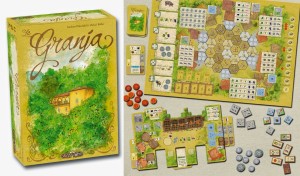 In La Granja, players control small farms by the Alpich pond near the village of Esporles on the island of Mallorca. Over time, the players develop their farms and deliver goods to the village. Players are vying to earn the title of La Granja for their country estate!
In La Granja, players control small farms by the Alpich pond near the village of Esporles on the island of Mallorca. Over time, the players develop their farms and deliver goods to the village. Players are vying to earn the title of La Granja for their country estate!
Over the course of 6 game rounds, players will expand their farm by adding fields, farm extensions, market barrows, and helpers. They will earn VPs by delivering goods to the village of Esporles. It is important to observe the actions of other players, manipulate turn order, and adjust your strategy based on the dice and cards.
La Granja is a fascinating game that requires careful planning. Timing and speed is crucial. However, successful players must cope with the uncertainty of events during the game. The player who has earned the most victory points at the end of the game is the winner and new owner of the La Granja estate!
The Voyages of Marco Polo
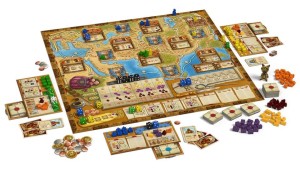 In 1271, 17-year-old Marco Polo started on a journey to China with his father and older brother. After a long and grueling journey that led through Jerusalem and Mesopotamia and over the “Silk Road”, they reached the court of Kublai Khan in 1275.
In 1271, 17-year-old Marco Polo started on a journey to China with his father and older brother. After a long and grueling journey that led through Jerusalem and Mesopotamia and over the “Silk Road”, they reached the court of Kublai Khan in 1275.
In The Voyages of Marco Polo, players recreate this journey, with each player having a different character and special power in the game. The game is played over five rounds. Each round, the players roll their five personal dice and can perform one action each turn with them.
After five rounds, the game ends with players receiving victory points for arriving in Beijing, fulfilling the most orders, and having reached the cities on secret city cards that each player gets at the start of the game; these points are added to the VPs gained during the game.
Dark Moon
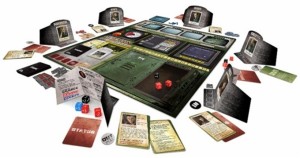 You are a crew member on a deep space mining expedition to Titan, the dark moon of Saturn. During a routine excavation, an “incident” occurs whereby some of the crew become infected with an unknown virus, and become paranoid, deceitful, and violent, trying to destroy the others.
You are a crew member on a deep space mining expedition to Titan, the dark moon of Saturn. During a routine excavation, an “incident” occurs whereby some of the crew become infected with an unknown virus, and become paranoid, deceitful, and violent, trying to destroy the others.
In Dark Moon, players are divided into two teams: Uninfected and Infected. The Uninfected team simply needs to survive until the end of the game, while the Infected team secretly attempts to destroy them. Each player knows which team they are on, but does not know which team the other players are on! Who is your teammate and who is your enemy? Can you trust your best friend? And why doesn’t anyone trust you when you tell them you’re one of the good guys?!
Roll dice, overcome traumatic events, throw your friends in quarantine when you don’t believe them, and (if you’re Infected) betray everyone at just the right moment to secure victory!
Flick em’ Up
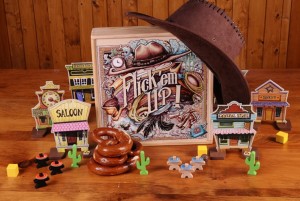 The cities in the West are not the safest place to be. In the disc-flicking game Flick ’em Up!, you can become an outlaw and rob banks, free prisoners, attack innocent bystanders…or you could become the Sheriff and try to protect the people of your city from these bandits!
The cities in the West are not the safest place to be. In the disc-flicking game Flick ’em Up!, you can become an outlaw and rob banks, free prisoners, attack innocent bystanders…or you could become the Sheriff and try to protect the people of your city from these bandits!
Relive the great adventures of the West, face your enemies in street duels, use different guns and tactics to get what you want. You can follow the scenarios or create your own — the choice is yours, cowboy!
The game will offer very high quality pieces and other wild west themed props for you to plan out your scenarios.
Dragon Run
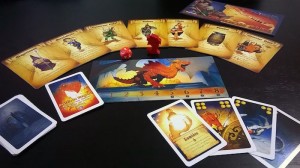 In Dragon Run, the players have just raided a dragon’s keep, picked up a bunch of loot, and awakened the dragon. Now it’s time to flee, ideally making it out with both our treasures and our lives.
In Dragon Run, the players have just raided a dragon’s keep, picked up a bunch of loot, and awakened the dragon. Now it’s time to flee, ideally making it out with both our treasures and our lives.
On each turn, a player can either advance boldly, flee cautiously, or cry like a baby. Rolling dice and drawing cards and applying effects will determine if you are successful. Gameplay lasts from 5 to 8 rounds. Each player has a unique power that can be used once per round: the thief can steal cards from opponents, the cleric can heal opponents in exchange for treasure, etc.
If the dragon loses its final temper point, the game ends and whoever holds the most valuable treasure wins; if all of the adventurers are charred to death first, then the dragon wins instead!
Stockpile
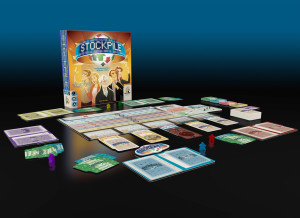 Stockpile is an economic board game that combines the traditional stockholding strategy of buy low, sell high with several additional mechanisms to create a fast-paced, engaging and interactive experience.
Stockpile is an economic board game that combines the traditional stockholding strategy of buy low, sell high with several additional mechanisms to create a fast-paced, engaging and interactive experience.
In Stockpile, players act as stock market investors at the end of the 20th century hoping to strike it rich, and the investor with the most money at the end of the game is the winner. Stockpile centers around the idea that nobody knows everything about the stock market, but everyone does know something. In the game, this philosophy manifests in two ways: insider information and the stockpile.
Both of these mechanisms are combined with some stock market elements to make players consider multiple factors when selling a stock. Do you hold onto a stock in hopes of catching a lucrative stock split or do sell now to avoid the potential company bankruptcy? Can you hold onto your stock until the end of the game to become the majority shareholder, or do you need the liquidity of cash now for future bidding? Do you risk it all by investing heavily into one company, or do you mitigate your risk by diversifying your portfolio?
In the end, everyone knows something about the stock market, so it all comes down to strategy execution. Will you be able to navigate the movements of the stock market with certainty? Or will your investments go under from poor predictions?
Bring Out Your Dead
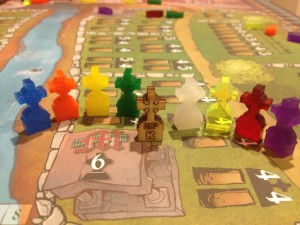 Bring Out Yer Dead is a morbid game of grave family plots.
Bring Out Yer Dead is a morbid game of grave family plots.
As the head of your family, you must get the “dying” members of your family into the best plots in the city’s newest cemetery. Each day the Grave Keeper brings the cart around the city and you must vie to get your family members in the cart before other families do. But be careful! The Grave Keeper is a lazy guy and any coffins he can’t fit in the cart are tossed aside in the river; he’ll never bother to bury them at all!
Get your recently departed family members buried in the best plots in the cemetery to gain influence in the city. You may even have to resort to some early morning grave swapping — or you could just rob the graves of all the jewelry you can dig up…it isn’t like they’re going to need it anyway! Influence is everything! The player with the most influence at the end of the game wins.
Abraca…What?
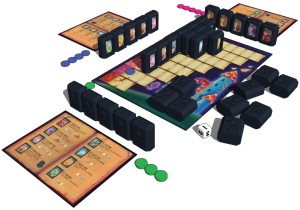 Abraca…what? is a family game of deduction and spellcasting. On your turn, you try to cast one of the spells you have in front of you — but it’s harder than it looks because only the other players can see which spells are available to you! So with cunning wit, clever logic, and a little luck, you have to determine which spells to use against your competitors. Watch your magic words, though, because if you try to cast the wrong spell too often, you’ll lose the game!
Abraca…what? is a family game of deduction and spellcasting. On your turn, you try to cast one of the spells you have in front of you — but it’s harder than it looks because only the other players can see which spells are available to you! So with cunning wit, clever logic, and a little luck, you have to determine which spells to use against your competitors. Watch your magic words, though, because if you try to cast the wrong spell too often, you’ll lose the game!
Different spells have different numbers on them (1-8) and the have different spell effects. Some will gain you health and others will deal damage to other players. If you try to cast a spell that you do not have you in front of you, then you end up damaging yourself. If you successfully cast your spell, you get to place your card on the board. Then you get another turn and can cast a spell again. The next spell you cast has to be equal or higher to the previous spell. To win you need to successfully cast all of your spells and empty your hand.
Catacombs
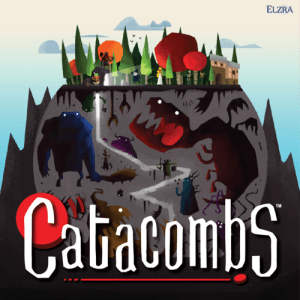 Catacombs is an action/dexterity-based adventure board game. One player controls the Overseer, controlling the monsters of the catacombs; the other player(s) control the four heroes who cooperatively try to defeat the monsters and eventually the Catacomb Lord. Each of the heroes has special abilities that must also be used effectively if they are to prevail.
Catacombs is an action/dexterity-based adventure board game. One player controls the Overseer, controlling the monsters of the catacombs; the other player(s) control the four heroes who cooperatively try to defeat the monsters and eventually the Catacomb Lord. Each of the heroes has special abilities that must also be used effectively if they are to prevail.
The main mechanism of Catacombs is for the players to flick wooden discs representing the monsters and the heroes. Contact with an opposing piece inflicts damage, but missiles, spells, and other special abilities can cause other effects. When all of the monsters of a room have been cleared, the heroes can move further into the catacomb. Items and equipment upgrades can be purchased from the Merchant with gold taken from fallen monsters. The Catacomb Lord is the final danger that the heroes must defeat to win the game; conversely, the Overseer wins if all of the heroes are defeated. The game is designed for quick set-up and fast play within 30 to 60 minutes.
Odyssey: Wrath of Poseidon
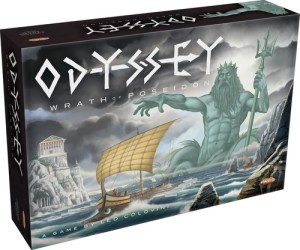 In Odyssey: Wrath of Poseidon, one player takes the role of Poseidon, God of the Sea, while the others become navigators in search of the Sacred Island. Gameplay takes place on two copies of the same game board that are separated by the game box so that they are not visible to one another. The Poseidon player throws powerful storms against the Navigators, driving them off-course and confounding them so that they cannot reach the Sacred Island in time. Only Poseidon knows the real position of the ships as indicated on his copy of the game board.
In Odyssey: Wrath of Poseidon, one player takes the role of Poseidon, God of the Sea, while the others become navigators in search of the Sacred Island. Gameplay takes place on two copies of the same game board that are separated by the game box so that they are not visible to one another. The Poseidon player throws powerful storms against the Navigators, driving them off-course and confounding them so that they cannot reach the Sacred Island in time. Only Poseidon knows the real position of the ships as indicated on his copy of the game board.
The navigators must sail through endless storms, blind to all around them, trying to gather clues to their whereabouts to stay on course. They also track the position of their ships on the game board, but the positions indicated are only a best guess — and they can become increasingly inaccurate as the game progresses.
The navigators must use their wits to stay on course and reach the Sacred Island before the end of the game, while Poseidon wins by preventing them from reaching their destination.




